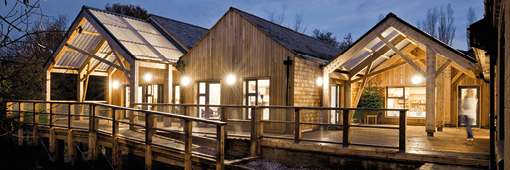23 October 2017
Gloucester Services: a beacon of hope for hungry drivers

Most people visiting a motorway service station use it as a quick pitstop to refuel and refresh. But there is little rush to leave Gloucester Services.
The project is the brainchild of John and Barbara Dunning, founders of Westmorland Ltd, who opened their first motorway service area at Tebay, Cumbria in 1972, when the M6 motorway cut a swathe through their farm.
Inspired by the Newgrange passage tomb, a World Heritage site in County Meath, Ireland, the family wanted a building that was reminiscent of a contemporary timber barn.
There are two buildings and two petrol stations on either side of the M5. Visitors enter a single-storey glazed entrance set within a gently mounded convex shape, covered with a luxuriant green roof which sweeps down on all sides, blending seamlessly with the Cotswold countryside. Outside there is a lake and waterfall, complete with ducks and dragonflies.
The Dunning family was determined to create a business that put quality food at the forefront of its offering. Instead of Big Macs, the service offers culinary delights such as venison and chilli pies and sourdough loaves.
Described by one restaurant critic as ‘a beacon of hope for hungry drivers looking for quality food’, Gloucester Services has its own kitchens, cooking hot food and home-made cakes. It has a food shop including a prime butcher’s and stocks deliciousness from 130 producers, all sourced within 30 miles of the site. Last year the group had more than eight million customers.
Sarah Dunning, who took over running her parents’ business in 2005, says: “We are a food business that is on the motorway rather than on the high street. Locality and provenance has always been at the centre of what we do. As farmers we understand the importance of working in partnership with the land around us and the impact we have on our landscape and communities. Because we live and work here it is important that we do it well and invest back into our communities because we, our families, our children and our grandchildren will live in this landscape and be part of those communities.”
The company puts a proportion of its turnover into community projects, mostly to fund children’s facilities within some of the more deprived districts of nearby Gloucester, where the charity focuses its efforts. It also provides work opportunities and training. More than 60 of the 150 staff were previously unemployed and 120 come from those same deprived areas.
 |
 |























